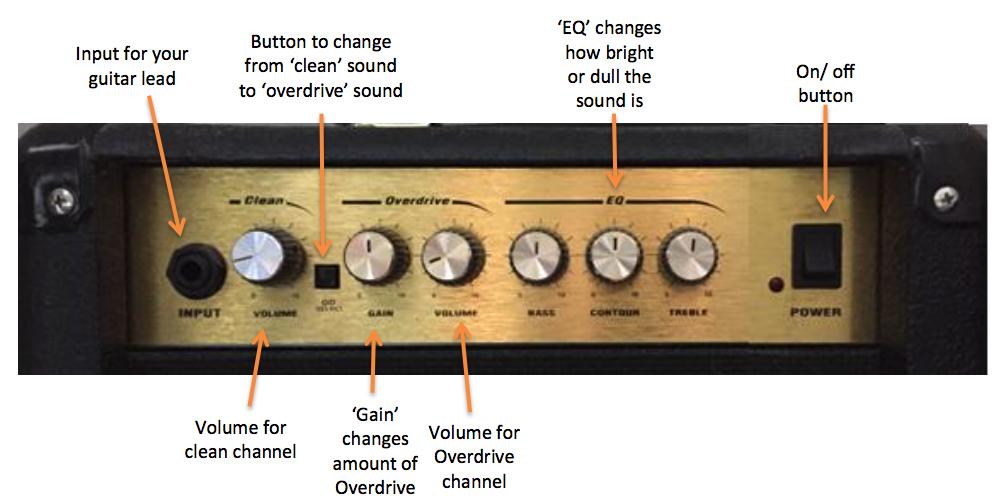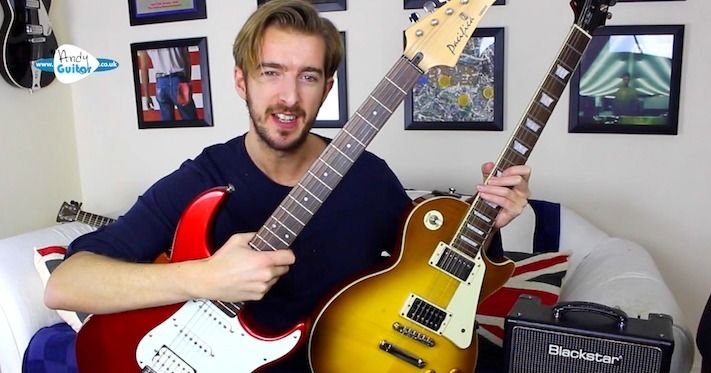In this video
Hi guys, welcome to the online version of my Electric Guitar Starter Course!
Here we're going to focus on the essential skills needed for beginners to play Rock Guitar.
As electric guitars can have many accessories such as an amplifier, guitar lead, etc, I thought I'd create this video to give you my complete guide to electric guitars and the gear that can be used with them!
I demo various things in the video above, but this is not a 'playing' lesson. If you'd prefer to get playing something straight away, check out lesson 1!
Electric Guitar Overview
Here's what all the parts are called. Images all from Andy's Beginner Course Book.
Electric guitars come in all shapes and sizes. However, most are variations on the following three guitar types. Each type has an identifiable look, shape and sound, which countless other makes and models have tweaked and copied.
Fender telecaster
Fender Stratocaster (aka 'Strat')
The best are made by Fender. Affordable copies are made by brands such as Squire and Vintage
Thin body and neck, easy to play.
Single Coil Pickups give a clean sound that is suited best to pop, blues, classic rock, pretty much anything!
Think Jimi Hendrix, Eric Clapton, John Mayer, Mark Knopfler, Stevie Ray Vaughn
Fender telecaster (aka 'tele')
Again the original and best are made by Fender. Affordable copies are made by Squire and vintage
Less flash than the strat with a much less tailored body (kind of like a flat block of wood). Seen as more of a 'working mans' guitar.
Pickups give a 'twang' that is suited best to indie, blues, classic rock. Think Keith Richards, Bruce Springsteen, Status Quo, modern 'Indie' bands like Block Party
Single coil or humbucker pickups available
Gibson Les Paul
Originals made by Gibson. Affordable copies made by Epiphone and Vintage. Similar models made my PRS.
More flash than this others, and more 'meaty' sounding humbucker pickups,
Great for all rock and metal, though originally a jazz and blues guitar
Think Jimmy Page, Slash, Joe Perry, Thin Lizzy, The Darkness
Guitar Amplifiers
A guitar amplifier is not essential to learn guitar. If budget or availability is an issue, just get hold of a guitar itself and start practicing, don't delay!
However, electric guitars sound quiet and similar to acoustic guitars when unplugged from an amp. The amp (or amp simulator) is essential to get the sounds and tone we'll be focusing on in this course!
My recommended budget electric guitar amplifier out of total personal preference is the Blackstar HT-1, which I demo in the video above!
Here is a quick guide to all the controls on a typical guitar amplifier so you know how to set it up (set to my recommended default settings!)

Controls on the amplifier
Most of these controls are found on all amplifiers. Many amplifiers have 2 'channels' named Clean & Overdrive switchable by a button or pedal.
Volume – Loudness
Gain/ Drive - Technically signal level, but in reality it’s the amount of fuzz, aka overdrive! There are 2 types of Gain or fuzz;
Overdrive – More natural sounding ‘fuzz’ sound similar to old valve amplifiers Distortion – A massive amount of fuzz, generally artificially created
EQ/ Equalisation - How we affect the treble, mid and bass
Bass – Low frequencies, deepness, boominess, etc
Middle – in between low and high. Boosting can make your sound more prominent or clearer (great for solos), reducing can fill out your sound, making your amp sound bigger?
Treble – High frequencies, brightness






